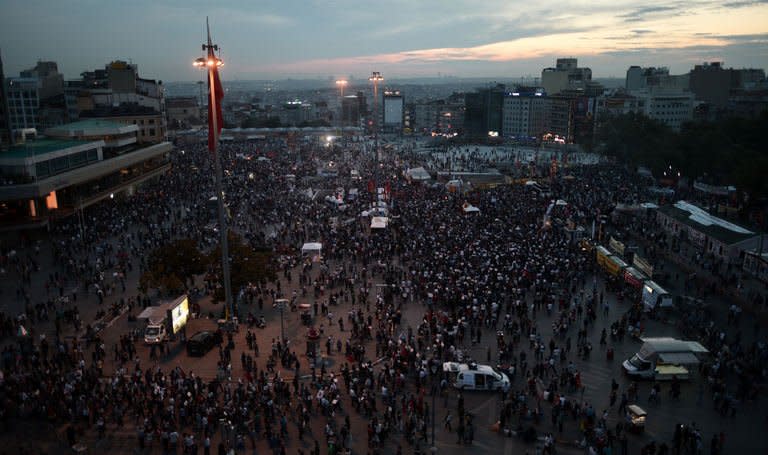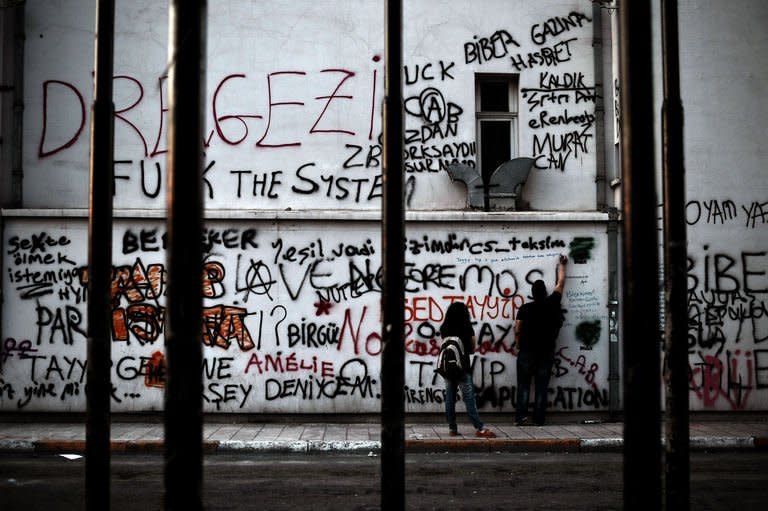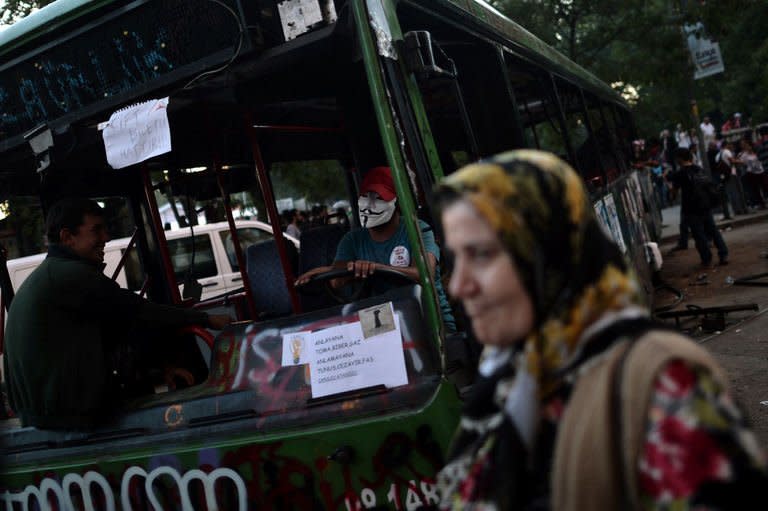Turkey PM fuels outrage with refusal to back down on park project
Turkish Prime Minister Recep Tayyip Erdogan enraged demonstrators on Thursday by defiantly vowing to press ahead with a planned park redevelopment that has sparked violent protests, as the country braced for his return from an overseas trip. The nationwide unrest, fuelled by outrage against his conservative reforms, has claimed a third life with the death of a policeman, media said, raising the pressure on the premier as he was due to fly back to Istanbul from Tunisia. Away for four days on an official trip to North Africa, Erdogan has refused to bow to the protesters against his Islamic-rooted AKP party, dismissing them as "extremists" and saying that everything would calm down before he returned. But the mass unrest has only intensified in his absence, with doctors reporting thousands of injured as police tried to quell the rallies in major cities with tear gas, pepper spray and water cannon. Hours before the premier's return, thousands of flag-waving, whistle-blowing demonstrators packed Istanbul's iconic Taksim Square, the epicentre of the protests, chanting: "Erdogan, Resign!" Speaking in Tunis on Thursday, Erdogan reiterated his claims that extremists and foreign agitators were to blame for the violence, and refused again to cancel plans to raze Istanbul's Gezi Park, whose conservation fight lit the flame of the protests. "Among the protesters, there are extremists, some of them implicated in terrorism," including some who were in Taksim Square where the trouble broke out last week, he told reporters. Seven foreigners implicated in the unrest have been arrested, Erdogan said, without specifying what part they had played in the violence. Later in Ankara, Interior Minister Muammer Guler said the foreigners detained were two French, two Iranians, a Greek, a German and an American, and that two had been released. Erdogan's uncompromising stance on the park project did not go down well with protesters in Istanbul, who said they were determined to win the battle. "We are angry. He doesn't listen," said biologist Senay Durmus, 25, vowing that she would protest in Taksim "every day after work until we win". But many stressed the nationwide displays of outrage went beyond Gezi Park. "This started with some trees. But I think it's about freedom," said 32-year-old Ali Ihsan Canimoglu, goggles wrapped around his wrist to protect his eyes in case of a tear gas attack. -- First police fatality -- A Turkish policeman died in hospital Wednesday hours after being injured in a fall while chasing anti-government protesters in the southern city of Adana, the private NTV news channel said. His death marked the first police fatality in seven days of clashes, with two young male protesters killed earlier. Opposition to Erdogan is intense, but the 59-year-old has won three elections in a row and gained almost 50 percent of votes in 2011, having presided over strong economic growth in recent years. The pro-AKP half of Turkey has remained largely silent in the past week of unrest, but CNN-Turk television reported on Thursday that several hundred people attacked a group of 25 youths who staged an anti-government protest in the Black Sea port of Rize, Erdogan's native town. Deputy Prime Minister Huseyin Celik has urged AKP supporters not to flock to the airport to welcome Erdogan back, to avoid inflaming tensions. Erdogan earlier said he could "mobilise a million supporters of my party" if he had to. "AKP supporters are like sheep. If Erdogan says go fight, they will fight. If he says stay, they will stay," said 24-year-old protester Ezgi Ozbilgin in Gezi Park. -- 'Not a second-class democracy' -- The national doctors' union has said that more than 4,300 have been injured in recent days, 47 of them seriously. Erdogan's critics accuse him of forcing conservative Islamic values on Turkey, a mainly Muslim but staunchly secular nation. They also say he has become increasingly authoritarian. Turkey, while acknowledging somepolice excesses, has hit back at criticism of its handling of the crisis, a Turkish foreign ministry source told AFP on Wednesday. The diplomat, speaking on condition of anonymity, said Foreign Minister Ahmet Davutoglu had told US Secretary of State John Kerry in a phone call Tuesday: "Turkey is not a second-class democracy." The US State Department later denied suggestions this was Washington's view of its NATO ally, a key strategic partner in the region, but said it had concerns "about instances of police brutality". Other Western allies of Turkey -- a country that straddles East and West and has long aspired to join the European Union -- have also voiced concern over the violence. The Istanbul stock market plunged after Erdogan spoke in Tunis, closing nearly five percent lower. It had earlier recovered from a 10 percent plunge on Monday.







